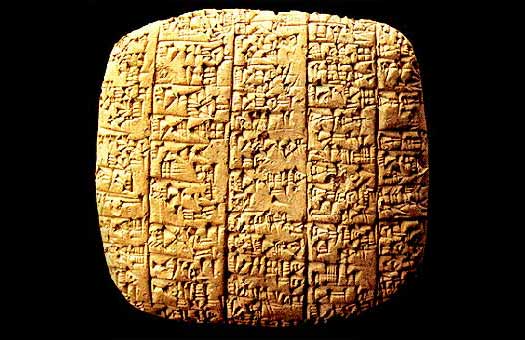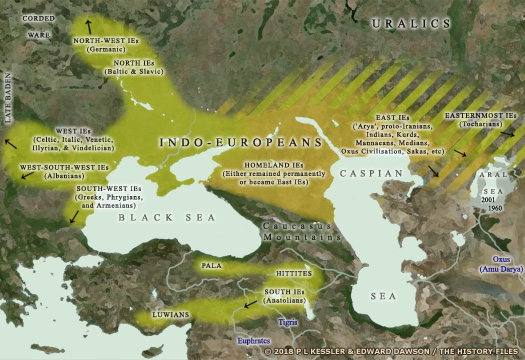
| EBLA When the royal palace of Ebla was rediscovered under a pile of rubble in the 1970s, its archives were found to house an enormous amount of correspondence, some of which mentioned Syrian and northern Mesopotamian states which were otherwise unknown. Kings and other representatives made offerings at Ebla's sanctuaries, diplomatic marriages were concluded, and wars were fought, most especially a long-running conflict against Mari, further to the south. The archive consisted of about 15,000 cuneiform tablets, mostly written in Sumerian, but the remaining 20% were in Eblaite, a previously unknown Semitic tongue.
Founded as a settlement by about 3000 BC, the later city was located around fifty-five kilometres (thirty-four miles) south of Alep (at Tell Mardikh in modern Syria), and it probably had close ties with Sumer from the start. Ebla means 'white rock', referring to the limestone outcrop on which it was built. Initial independence seems to have been ended by Mari, until a local dynasty under Eberu freed the city and was probably responsible for creating its first golden age during which most of its correspondence was written (until circa 2250 BC).
(Additional information by Francesco Costa.)
Nothing is known about the earliest kings other than their names, taken from an Eblaite tablet translated by Mario Liverani.
Abur-Lim
Agur-Lim
Ibbi-Damu
Ba-Damu
Enar-Damu / En-ar-Damu
Ishar-Malik
Kum-Damu
Adub-Damu
c.2400 BC : Iblul-Il of Mari is credited with conquering Ebla (and its subject city of Harran). Between this date and around 2250 BC the city reaches its peak of achievement and development. The Eblaites elect a local merchant ruler as their king (although the use of this is disputed by scholars, with some preferring to use 'minister'), with each term of office lasting for seven years. The names of the three known merchant kings match those which are sometimes ascribed to the Awan kings of Elam, so if they are one and the same, perhaps the 'elections' were nothing of the kind.
The surviving 17,000 or more clay tablets in the library of Ebla's Royal Archives are the earliest written documents in Syria, and they provide a wealth of detailed information about the region and its kingdoms and trade networks Igrish-Halam / Igris-Kalem : Elected ruler.
Irkab-Damu / (Ish'ar-Damu?) : Elected ruler. Name in parenthesis may be a different person.
Ar-Ennum / Arennum / Arrukum : Elected ruler.
c.2334? BC :
Ebla is devastated by the Akkadian empire, probably under Sargon (who later states that he passed through Mari and used it as his base of operations in his campaign to the west). Egyptian pottery seals listing Pepi I are among the debris.
c.2330? BC :
The city breaks with tradition when Eberu founds a (short-lived) hereditary monarchy. He concludes a treaty with Tudia of Ashur which offers him the use of an official trading post over which Ebla would maintain control. Ebla now reaches the height of its prosperity, and it is during this period that its archives are created.
fl c.2300 BC :
Eberu / Ibrum / Ebrium / Ibrium
? - c.2250 BC :
Ibbi Sippis / Ibbi Zikir : Son. Fifth and last king (or minister) of this period.
Ebla and Mari conduct a long-running conflict against each other, probably for control over the trade route to Sumer. Mari has the upper hand until the last Ebla ruler of the period (Ibbi Sippis) manages to reverse the situation and destroy the enemy. Ibbi Sippis also concludes treaties with neighbouring Alep (or Armi, as the Eblaites refer to it).
c.2250 BC :
Being one of the states which revolts against Naram-Sin of Agade, Ebla is conquered in order to subdue it, ending its first golden age.
From the discovery of seals there which bear her name, it seems that Naram-Sin's daughter is the object of a diplomatic marriage, probably to Ebla's ruler. Ebla is able to regain some economic importance in the region, but does not return to its former levels of glory. It is possible the city has economic ties with the nearby city of Urshu, as is documented by economic texts from Drehem (a suburb of Nippur), and from findings in the Assyrian trading colony of Kanesh in Anatolia.
c.2200 BC :
The region is disrupted by invasions by barbarians from the north. Naram-Sin of Agade may have taken advantage of the destabilisation of this period, but as this conquest comes around half a century beforehand, he may also be at least a partial cause of it.
It seems more than coincidental that 'barbarians from the north' are causing problems at the same time as the Gutians are first mentioned, possible Indo-European tribes who inhabit the Zagros Mountains. In the same period, Indo-European tribes in the form of the Luwian peoples are settling across southern Anatolia, making it likely that one of these groups is responsible for probing expeditions farther south.
By around 3000 BC the Indo-Europeans had begun their mass migration away from the Pontic-Caspian steppe, with the bulk of them heading westwards towards the heartland of Europe c.2112 - 2004 BC :
Ebla is controlled by the third dynasty at Ur.
c.2000 - 1900 BC :
Ebla is one of the northern Syrian states to survive the downturn in the region's fortunes. It now falls under the control of Mari's dynasty of generals.
c.1950? BC :
Ibit-Lim / Ibbit-Lim : A member of the dynasty of generals in Mari.
c.1900 BC :
With the end of the dynasty of generals, Ebla falls under Amorite control. Within about half a century it starts to regain a level of its former glory and prosperity which lasts until about 1600 BC.
c.1776 - 1600 BC :
Following the break-up of the kingdom of Upper Mesopotamia, Yamkhad becomes the dominant force in north-western Syria, controlling Ebla. The city continues to prosper until it is again destroyed, this time by a Hittite king (Mursili I or Hattusili I).
fl c.1470 BC :
Zakkar : Visited by Idrimi of Alep after the latter fled his homeland.
c.1400 - 900 BC :
The city falls under Aramaean control, which they exercise over much of the region from Alep. Ebla never recovers from its destruction in c.1600 BC, and it remains a small village until it is finally abandoned and forgotten in the seventh century AD.
Source :
https://www.historyfiles.co.uk/ |

